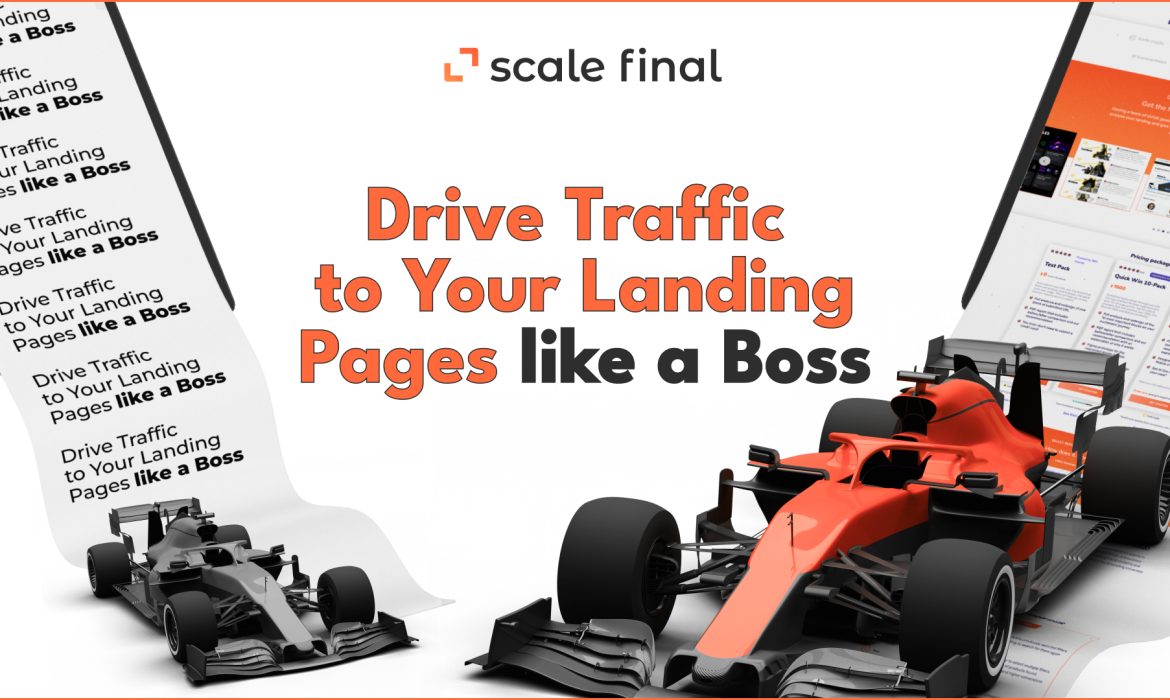Home • Blog • Drive traffic to your landing pages like a boss
Drive traffic to your landing pages like a boss
There’s no point in a landing page if your potential customers do not see it. In Landing Page That Convert: The Winning Formula, we gave you a step-by-step guide on creating such a page. In short: product pitch, clear copy, trustworthy social proofs, and powerful CTAs – all well thought out.
What we missed is how you drive traffic to your website landing pages. That’s what we’re going to talk about today.
After implementing the formula, you need to consider where your target audience is spending time online. Even if you already know your target audience pretty well, you should consider this guide as a help to increase your reach.
Once you can confidently identify the traffic sources, you can promote your landing page through the appropriate digital channels.
What are they? Traffic-generating techniques are divided into 4 main categories:
- Paid Search Advertising
- Social Media
- Email Marketing
- Organic Search and SEO
Let’s dig in.
Paid search advertising
Consider this: According to Internet Live Stats from 2022, Google processes over 8.5 billion daily search queries. A piece of that traffic to your landing page would be great, wouldn’t it?

One of the ways to attract new customers is through pay-per-click (PPC) campaigns. Simply put, people use Google to search for products or services that your business can offer.
With paid search advertising, you can place your ad at the top of the search engine results page (SERP), increasing your chances of being seen and positioning your business as a top provider for their needs.
You’ve seen it many times before. Paid ads appear at the top of Google Search and are identified by the little “Ad” on the left side of the page. One-third of users are clicking on paid search ads, according to Clutch.co. Now do the math.

You can choose which link you want to put. Of course, you can just promote your homepage, but as we said in Landing Page That Convert: The Winning Formula, linking to a landing page is much more effective. Remember that your paid search ad should match your landing page text and call to action.
Paid social media advertising
It’s almost impossible to imagine a great business without a strong online presence. Thereby, we all use social media platforms like LinkedIn, Twitter, and Instagram. Not only to connect with our audience but to drive sales.
By paying for ads on social media, you can reach more people and find out what kind of content works best on each platform. This way, you can create better content while attracting more traffic to your landing page.
Posting regularly on your company’s social media is just as valuable as maintaining a sales relationship.
When you use social media to be transparent about your business and your company values, your customers can build an emotional connection with your product.
More on building an emotional connection with a customer: Neuromarketing is Gold?

Email campaigns
Email is often touted as the most effective marketing channel because it has tremendous reach (and low cost) compared to other platforms. A powerful combination of emails and landing pages is used to maintain existing customer relationships and attract new ones. After creating a contact list, you can entice readers with your offer with a carefully crafted email, while the landing page lists the details and prompts visitors to take action.
Tip: To convince an email recipient to buy your product, you need at least an original subject line, a fancy design, and at most personalized product recommendations that match the interests of that particular user.
Organic search and SEO
To ensure your business appears in online searches, it’s important to have useful and interesting content on your website or landing pages. This takes time and effort, and some experts, called SEO professionals, specialize in improving your ranking. First, you need to research what people are searching for and use those keywords on your website.
The higher your content ranks, the better.
You can use tools like Ahrefs or Keywords Everywhere to find important information for your website. With these tools, you can find out things like where your site ranks in search results, what questions are commonly asked about your brand, which backlinks lead to highly ranked pages, and the amount of traffic your competitors are getting. They can also help you identify relevant keywords and long-tail keywords.

Author
-
 CEO of ScaleFinal
CEO of ScaleFinalI'm CEO of Scale Final and an experienced SEO specialist obsessed with trackable results and process optimization. My personal motto is "Get more by spending less". My interests and hobbies include: Yoga, tea culture, skateboarding, board games, Mafia social game, arthouse cinema, off-road cycling, psychology, Zen Buddhism and meditation.
View all posts






